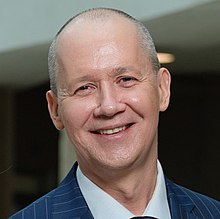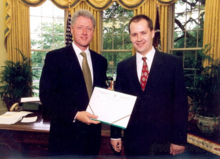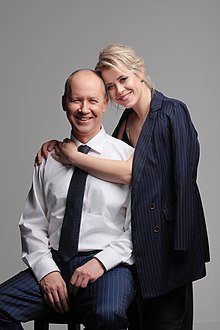Valery Tsepkalo
Valery Tsepkalo (Belarusian: Валерый Цапкала, Russian: Валерий Цепкало; born 22 February 1965) is a Belarusian politician, diplomat, executive, and entrepreneur, the founder of Belarus Hi-Tech Park.[1][2] Doctor in International Law. From 1997 to 2002 he served as Ambassador to the United States of America and to Mexico, and from 2005 to 2017 he headed Belarus Hi-Tech Park which became the largest IT cluster in Central and Eastern Europe over that period. Currently he is a governmental expert to the UN Secretary General in the field of information and communication technologies.
Valery Tsepkalo | |
|---|---|
Валерий Цепкало Валерый Цыпкала | |
 | |
| Born | 22 February 1965 Grodno, Belarussian SSR, Soviet Union |
| Alma mater | Moscow State Institute of International Relations |
| Occupation | Politician, diplomat, executive, and a tech entrepreneur |
Biography
Valery Tsepkalo was born in Grodno on 22 February 1965 to a family of chemical engineers. He graduated from Grodno Secondary school No.14 with advanced program in the English language. In 1982 he entered the Belarusian Technological Institute (currently the Belarusian State Technological University) in Minsk where he studied till 1984. In 1984—1986 he underwent compulsory military training in the Strategic Missile Forces. After that, he studied at the Moscow State Institute of International Relations of the Soviet Ministry of Foreign Affairs and graduated with honors[3] in 1991. He pursued a postgraduate program there, graduated with honors as well, lectured, and got his PhD degree in International Law.
Career
Diplomatic and political career
He started his diplomatic career in 1991 in the Soviet Embassy in Finland. After the dissolution of the Soviet Union, he decided to return to Belarus, and in 1992 he took a position in the Ministry of Foreign Affairs of Belarus. In 1993—1994 he was a foreign policy adviser to the Chairman of the Supreme Soviet Stanislau Shushkevich. Later, Shushkevich characterized him as a skilled psychologist and professional. Shushkevich recalls that Tsepkalo helped him at the time when he was in disgrace. Later he became an adviser to the Executive Secretary of the Commonwealth of Independent States.[4][5]

During 1994 presidential campaign Tsepkalo joined Alexander Lukashenko, along with Viktar Hanchar, Leanid Sinitsyn, Alexander Feduta, and Yury Zacharanka.[6] As some analytics observed, Lukashenko "was an outsider, a former farm manager, seen as a man of the people, who unexpectedly beat a pillar of the former communist establishment."[7] Tsepkalo became one of the campaign managers. He arranged Lukashenko’s visit to Moscow State Duma and the influential LDPR Party to gain additional political weight.
After Lukashenko's victory, in 1994 he was appointed First Deputy Minister of Foreign Affairs. From 1997 to 2002 he served as Ambassador Extraordinary and Plenipotentiary of the Republic of Belarus to the United States and the United Mexican States.[8] Upon completing the diplomatic service in the USA, he was appointed Assistant to the President of Belarus on science and technologies.[9]
Creation of High Tech Park
The idea to establish the Belarusian Silicon Valley first appeared when Valery Tsepkalo was visiting the Silicon Valley during his diplomatic service in the USA. Tsepkalo was impressed by the effectiveness of the ecosystem, which stimulated the development of technology companies. The success of Belarusian IT companies in the USA made him think about the possibility of creating favorable conditions for the development of technologies in the Republic of Belarus. Created in 2005, the High-Tech Park aimed to stop the outflow of IT specialists abroad.[10][11]
He convinced the authorities to create a special economic zone with tax breaks for tech companies and employees. The government donated an abandoned building on the outskirts of Minsk and guaranteed a 1-year $300,000 loan at 17% interest rate to help get it up and running.[12]
On 22 September 2005, Decree On the High-Tech Park was signed, securing benefits for IT-companies.[13] The extraterrestrial High Technologies Park (HTP) was launched in 2005 under Tsepkalo’s lead.[14]
Over the 10-year history of the Belarus Hi-Tech Park, the number of its residents has increased 59 times (from 4 companies in 2006 to 237 companies in 2017), computer software and services exports have evolved 49 times (from $21 million in 2006 to $1025.0 million in 2017), the number of HTP employees has raised 13 times (from 2,506 in 2006 to 32,598 in 2017), and Belarus has improved its ICT Development ranking by 41 positions, according to the International Telecommunication Union.[15]
Dismissal
On 2 March 2017, Tsepkalo was released by presidential decree from the director’s post at the HTP. Since 2005 the HTP rose to 237 companies with total annual export over $1 bln. The official media explained the dismissal by the lack of product IT companies and the prevalence of outsourcing developers. After the dismissal, Tsepkalo was criticized by his successor for his selectivity of the HTP residents. Tsepkalo justified his strategy by saying that the first steps are always the hardest to make. The careful selection of the first HTP residents resulted in a high reputation of the Park in the years to follow and a steady flow of investments and orders. After Tsepkalo's dismissal, the new administration focused on statistical growth accepting more than 200 new residents in 2018.[16][17][14] [18]
After the HTP
In 2018 he took part in the development of the Mirzo Ulugbek Innovation Center (ICSU) in Uzbekistan. Tsepkalo also consulted governments of Azerbaijan and Georgia on IT legislation issues. He also took part in a large IT project in Saudi Arabia.[19] At present, he is a member of the Strategic Council of the United Nations Global Alliance for ICT and Development.[20] and a government expert to the UN Secretary General in the field of information and communication technologies in the context of information security.[21] On 8 May 2020, Valery Tsepkalo announced about his decision to run for president elections in the Republic of Belarus.
Presidential Campaign
On 8 May 2020, Tsepkalo announced his candidacy for Belarus presidency.[22] To finance the campaign he sold his 418.3 m² house on leaseback terms.
He announced the start of his presidential election campaign by saying:"I would like to restore respect for all citizens of Belarus. I would like to return respect for everyone, no matter who you are, how old and how sick you are. I want to return a respectful attitude to all people of our country." At the press conference, he highlighted the major problem of Belarus: "The biggest threat for Belarus is an inefficient economy, an archaic system of government, and poverty. It’s long past time to reject the obsolete system of government where one person’s mood sets the tone for the whole nation, every day. It’s time to give back the power to the people of Belarus."[23]
"I would like to see the country as a normal European country, where the parliament will reflect the interests of the constituency of their people, not reflect the vision of only one person," Tsepkalo tells me. "I would like to make Belarus a normal European country; a normal democratic country. My vision is to make Belarus the high-tech park," he adds. "To make a good salary for the whole economy."[24]
Lukashenko claimed that Tsepkalo was dismissed as the HTP director for a reason which he should reveal himself.[25] Tsepkalo expained that he was fired because he openly defended Victor Prokopenya and other influential information technology (IT) entrepreneurs, who were detained for their business activities.[26][27][28]
According to the Belarusian political analyst Artyom Shraibman’s article for Carnegie Moscow Center, 2020 presidential elections will be special for "two prominent members of the establishment" — Valery Tsepkalo and Viktar Babaryka.[29] The Belarusian philosopher Vladimir Matskevich compared Tsepkalo’s running for president to 2006 Alyaksandr Kazulin’s campaign, launched only as a spoiler to the current government.[30] Shraibman mentions the similarities between political programmes of Tsepkalo and Babariko — both promise a comprehensive state modernization and economic liberalization, a president to be seen as a manager with a two-term limit, a ‘friendship with all’ foreign policy.[29] Red Herring (magazine) also mentioned that Tsepkalo wants to open Belarus’ economy and limit leadership to two terms.[31]
During the signature collection period, Tsepkalo toured major cities and towns of Belarus, visiting pickets and meeting with voters. On 24 June, Tsepkalo announced that he had handed over 160 thousand signatures to the Central Election Commission with the required 100 thousand. Registration of candidates for the presidential elections, which will be held on 9 August, is scheduled for 5–14 July. On 30 June, the Central Election Commission announced that only 75,000 were valid — less than the 100,000 needed. [32] [33]
On 24 July 2020 Tsepkalo and his two sons fled to Russia after being barred from running in the election and alleged threats of prosecution by the prosecutor's office, which declined to comment on Tsepkalo's escape.[34]
Views
Tsepkalo believes that private property is the basis not only for successful economic and social development, but also serves as a foundation for individuals' personal freedom, dignity and self-esteem. He states that real freedom depends upon individuals' economic sovereignty. To his mind, the aspiration of individuals towards economic freedom and individual independence is the main source of human civilization's evolution.[35]
Valery Tsepkalo thinks that property is the embodiment of personality and the main dimension of human existence. It is the condition for the realization of human essence. Therefore, governments should be assessed based on their actions to help their citizens achieve economic freedom as a condition for respect and individual dignity.[36]

In addition, he claims that if possessions simply aim at satisfying human needs such as food, clothing, and shelter, they are essential only for the reproduction of life, i.e. it is the means of satisfying the physical needs of the individual. The possession of the property, such as land ownership, shares, stocks, as well as knowledge and skills signifies not the biological nature of people, but people as social beings. In Mr. Tsepkalo's opinion, the possession of property provides for the ability to reflect on oneself and on social life, and the ability to create new environments. These social needs are related to the acknowledgement of the values one possesses and which are worthy of other people's esteem.[37]
Personal life
Married to Veronika Tsepkalo. Veronika is from Mogilev, graduated from Faculty of International Relations (Belarusian State University), then studied at the Higher school of management and business of Belarus State Economic University. Then she studied business management in India, has worked for a major international Corporation for the past 10 years. The couple has two children.[38][39]
Criticism
Media pressure after the start of presidency campaign
Tsepkalo's announcement of his campaign was a big surprise for Belarusian society.[40][41] After his dismissal from HTP, the official media tried to diminish the achievements made by Tsepkalo and the HTP before 2017.[42] The administrative change in the HTP affected the attitude of dev.by, the main internet media about Belarusian IT, affiliated to HTP and its residents, towards Tsepkalo. On the day after the announcement of Tsepkalo running for elections, dev.by published an article attacking Tsepkalo. Tsepkalo was said to have sent an edited version of his interview and was forced by respond to the journalist's insistence by prohibiting to publish the original version.[43] Throughout the election campaign, dev.by used any source of information to attack the reputation of the HTP creator. Such strange behavior of the media which has never been engaged in politics, caused a lot of readers' comments on subjectivity based on personal or political issues.[44][45][46][47][48][49] A similar attempt was made by village.me when they made a separate article about users' attempts to edit Tsepkalo's personal page on Russian Wikipedia, which does not contradict Wikipedia normal practice and was used to attract publicity to some provocative (the term was used by the publisher in the article's title) and unconfirmed facts.[50]
Research and publications
- 80 articles on religion, world economy, and foreign policy.[51]
- 20 articles on e-government, information technology, and intellectual property.[51]
- Publications in Foreign Affairs, Journal of Congress, Washington Post, Frankfurter Allgemeine, and Horizons.[52]
- By the Road of Dragon States book on economic development of new industrialized nations of South-East Asia.
- Man Everlasting book on the mystery of death and resurrection.
- Hi-Tech Park: 10 Years of Development book on Belarus HTP success story.
- Author of patented method of people search based on collateral features.[53]
Other occupations
- Member of the Strategic Council of the United Nations Global Alliance for ICT and Development.[54]
- Government expert to the UN Secretary General in the field of information and communication technologies in the context of information security.[55]
- In 2018 he took part in the development of the Mirzo Ulugbek Innovation Center (ICSU) in Uzbekistan.[56]
References
- "Глава Администрации президента рассказывает о "Силиконовой долине" в режиме online". TUT.BY (in Russian). 7 July 2004. Retrieved 25 June 2019.
- "Создатель Парка высоких технологий Валерий Цепкало отметил юбилей". SB.BY (in Russian). Retrieved 25 June 2019.
- "Diploma of Valery Tsepkalo".
- Background (in Russian)
- Кто такой Валерий Цепкало
- "Пять избирательных кампаний Лукашенко". Retrieved 2 July 2020.
- "Profile: Europe's last dictator?". Retrieved 2 July 2020.
- "О назначении Валерия Цепкало директором администрации Парка высоких технологий". Retrieved 27 November 2018.
- Valery Tsepkalo
- "Inside the plot to topple Europe's last dictator". Retrieved 2 July 2020.
- "IAs Belarus' Dictator Flails, a Tech Leader Waits". Red Herring. Retrieved 2 July 2020.
- "Belarus tech dream is a walk in the park". Financial Times. Retrieved 2 July 2020.
- "Валерий Цепкало больше не директор ПВТ (обновлено)" (in Russian). dev.by. 2 March 2017. Retrieved 27 November 2018.
- "Пять главных достижений Цепкало на посту главы ПВТ". dev.by (in Russian). 3 March 2017.
- https://dev.by/news/pyat-glavnyh-dostizheniy-tsepkalo-na-postu-glavy-pvt Пять главных достижений Цепкало на посту главы ПВТ]
- "Создал ПВТ, помог Лукашенко, написал книгу о бессмертии. Кто такой Валерий Цепкало?" (in Russian). Bel.biz. 12 May 2020.
- "Беларусь: IT-чудо или небольшой региональный игрок с сотыми долями процента рынка". Retrieved 27 November 2018.
- "Belarus' 23-year President Doubles Down on Tech, as Domestic Confusion Reigns". Red Herring. Retrieved 13 March 2017.
- "Основатель белорусского ПВТ Валерий Цепкало прибыл в Ташкент". infocom.uz (in Russian). Retrieved 25 June 2019.
- "Belarus Hi Tech Park - - Director of Belarus HTP Elected as Member of Strategy Council of UN Global Alliance for ICT and Development". www.park.by. Retrieved 25 June 2019.
- "Biographies of UNIDO panelists" (PDF). www.unido.org. Retrieved 14 December 2018.
- "Многоходовка или пиар? Зачем бывший глава ПВТ Цепкало бросил вызов Лукашенко" (in Russian). БелаПАН. 12 May 2020.
- "Пресс-конференция Валерия Цепкало" (in Russian). 2 July 2020.
- "Inside the plot to topple Europe's last dictator". Wired. 20 June 2020.
- "Лукашенко про Цепкало: Пусть скажет, почему я его уволил. И ему не захочется идти на выборы" (in Russian). Наша Нiва. 29 May 2020.
- "Reports: IT company bosses detained in Minsk". udf.by. 2 July 2020.
- "Reports: IT company bosses detained in Minsk". udf.by. 2 July 2020.
- "Valery Tsepkalo: "Criminal Code should for a long time exclude liability for illegal business activity"". The Minsk herald. 2 July 2020.
- Артём Шрайбман (27 May 2020). "Выборы перед новой эрой. Почему выходцы из элиты бросили вызов Лукашенко" (in Russian). Московский центр Карнеги.
- "Вы знали, что Цепкало вёл Лукашенко на выборы-94? А что ПВТ обзванивают против него? Вот полная история – раз уж все спорят о нём". kyky.org. 14 May 2020.
- "As Belarus' Dictator Flails, a Tech Leader Waits". Red Herring (magazine). 25 June 2020.
- "Belarus Ministry of Internal Affairs starts checking another rival of Lukashenko". RBC. 2 July 2020.
- "Belarus denies main president challenger spot on ballot". SF Gate. 2 July 2020.
- "Belarus opposition leader flees abroad with two sons ahead of election". Reuters. 24 July 2020. Retrieved 24 July 2020.
- https://realt.by/news/article/27802/
- https://rep.bntu.by/bitstream/handle/data/58540/%d0%a1.%2074-80.pdf?sequence=1&isAllowed=y
- https://rep.bntu.by/bitstream/handle/data/58540/%d0%a1.%2074-80.pdf?sequence=1&isAllowed=y
- REFORM.by (21 May 2020). "Фотофакт: жена Валерия Цепкало пришла на пресс-конференцию" (in Russian). REFORM.by. Retrieved 23 May 2020.
- "«Выходить с женой в свет — нормально. Люди хотят видеть, кто рядом с президентом». Интервью с Вероникой Цепкало" (in Russian). TUT.by. 28 May 2020.
- "Бывший директор Парка высоких технологий идет в кандидаты на пост президента Беларуси" (in Russian). Комсомольская Правда. 8 May 2020.
- "«В сторону рассвета». На странице экс-главы ПВТ Цепкало опубликовано сообщение о выдвижении в президенты" (in Russian). tut.by. 8 May 2020.
- "Мама Валерия Цепкало про сына: он всегда шел к своей цели". Retrieved 4 July 2020.
- "Цепкало продал дом, чтобы баллотироваться. И запретил dev.by публиковать полную версию интервью" (in Russian). Dev.by. 12 May 2020.
- "«Всё враньё». Что не так с ответом Цепкало на вопрос dev.by" [What is wrong with Tsepkalo's answers to dev.by's questions] (in Russian). dev.by. 4 July 2020.
- "Застройщик: «Цепкало за дом не заплатил». Выслушали все стороны" (in Russian). dev.by. 29 May 2020.
- "Цепкало продал дом, чтобы баллотироваться. И запретил dev.by публиковать полную версию интервью. Выслушали все стороны" (in Russian). dev.by. 12 May 2020.
- "Почему dev.by опубликовал текст про дом Валерия Цепкало" (in Russian). dev.by. 1 June 2020.
- "МВД проводит проверку «фактов противоправной деятельности» Валерия Цепкало" (in Russian). dev.by. 29 June 2020.
- [pochemu-devby-opublikoval-tekst-pro-dom-tsepkalo "Штаб Цепкало ответил застройщику"] Check
|url=value (help) (in Russian). dev.by. 29 June 2020. - "Как со страницы Валерия Цепкало в «Википедии» пытаются удалить провокационную информацию" [Attempts to Remove Provocative Data from Ru-Wiki Valery Tsepkalo's page] (in Russian). Village Belarus. 29 May 2020.
- "Group of Governmental Experts on Developments in the Field of Information and Telecommunications in the Context of International Security" (PDF).
- "The Remaking of Eurasia". Retrieved 27 November 2018.
- "United States Patent Application: 0190102470". appft.uspto.gov. Retrieved 26 June 2019.
- "Belarus Hi Tech Park - - Director of Belarus HTP Elected as Member of Strategy Council of UN Global Alliance for ICT and Development". www.park.by. Retrieved 25 June 2019.
- "Biographies of UNIDO panelists" (PDF). www.unido.org. Retrieved 14 December 2018.
- "Основатель белорусского ПВТ Валерий Цепкало прибыл в Ташкент". infocom.uz (in Russian). Retrieved 25 June 2019.
External links
- Tsepkalo — Valery Tsepkalo at Livejournal.